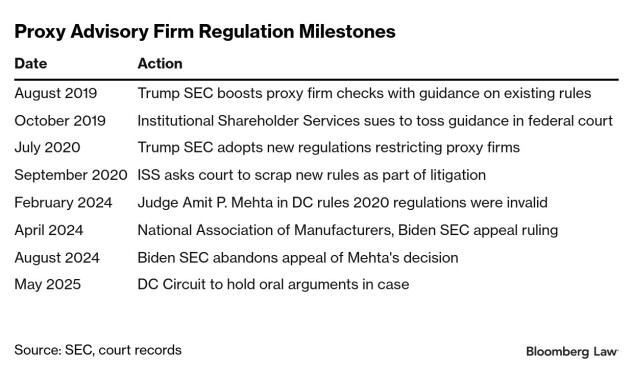- Court will hear oral arguments Friday over legality of rules
- Proxy firm ISS and manufacturers will square off in DC Circuit
A federal appeals court will wade deeper into a long-simmering debate over placing limits on firms that guide shareholder voting, as companies and Republicans battle advisers they say have too much influence over investors.
The US Court of Appeals for the District of Columbia Circuit on Friday will hear oral arguments about the legality of curbs the Securities and Exchange Commission placed on
A lower court tossed the 2020 regulations last year after ISS sued to stop them. Anti-fraud and public filing requirements in the rules are supported by the National Association of Manufacturers, which appealed the decision to the DC Circuit.
The DC Circuit’s scrutiny will come as Republicans have ramped up attacks on ISS and Glass Lewis, which control most of the proxy advice industry.
House Republicans launched an antitrust investigation into ISS and Glass Lewis this year and are pursuing legislation to restrict the advice the firms give to pension funds and other institutional investors voting at company annual meetings. Bills targeting proxy firms are in the early stages of congressional consideration and would take months, if not years, for the SEC to implement, if they become law.
Companies have said ISS and Glass Lewis improperly use their dominance to shape vote outcomes on matters such as board director elections, executive pay, and environmental, social, and governance proposals—claims the proxy firms deny.
The National Association of Manufacturers is committed to battling for proxy firm rules in—and out of—court, said Charles Crain, managing vice president of policy at the business group. Regulating proxy firms without new laws would be very challenging, unless the DC Circuit upholds the 2020 rules, he said.
“Is this high stakes? Absolutely,” Crain said. “Is this the end of the fight if the NAM were to lose? No, it’s not.”
An ISS spokesperson declined to comment. A Glass Lewis representative didn’t respond to requests for comment.
Legal Arguments
The defense of the 2020 rules during oral arguments will be up to Paul Hughes, a McDermott Will & Emery partner representing the manufacturers group. Lawyers for the SEC withdrew from the litigation after the agency abandoned its defense of the rules in court during the Biden administration. The SEC, now under Republican leadership in the second Trump administration, has not re-entered the legal fray.
The National Association of Manufacturers has argued in legal briefs that Judge Amit P. Mehta of the US District Court for the District of Columbia erred in 2024 when he ruled the proxy firm regulations were invalid. The requirements are “commonsense measures to protect investors,” which the SEC had the power to issue, the organization told the DC Circuit in March.
ISS has defended the Mehta ruling, saying the SEC lacked the authority to put it in a regulatory regime for activist investors and company managers looking to sway shareholder votes, a process known as solicitation. ISS doesn’t try to gather support for one side or another in votes at annual meetings, it told the DC Circuit in a January filing.
DC Circuit Judges Bradley Garcia, Karen Henderson, and Neomi Rao will hear the oral arguments. Republican appointees hold the majority on the three-judge panel. President Joe Biden appointed Garcia, President George H.W. Bush picked Henderson, and President Donald Trump tapped Rao.
Hughes and Jeffrey Harris, a Consovoy McCarthy PLLC partner representing ISS at oral arguments, likely will face questions about the definition of solicitation—and whether proxy firms solicit votes.
“It’s now a war over what’s the plain meaning of ‘to solicit,’ ” said Sara Crovitz, a co-chair of the investment management practice at Stradley Ronon Stevens & Young LLP.
Republican Attacks
The Republican lawmakers who control Congress are moving ahead on proxy firm restrictions with or without the DC Circuit’s support for the 2020 rules.
A House Financial Services subcommittee held an April 29 hearing on what it called the “proxy advisory cartel” of ISS and Glass Lewis. A half-dozen draft bills targeting proxy firms were brought up for discussion.
The hearing came after the House Judiciary Committee in March demanded documents from ISS and Glass Lewis to help the panel “evaluate the sufficiency of US antitrust laws to address competition concerns in the proxy advisory market,” according to letters sent to the firms.
The Heritage Foundation has urged the Department of Justice or Federal Trade Commission to investigate ISS and Glass Lewis for antitrust violations to help the Trump administration fight ESG initiatives. The group made the recommendation in “ESG, DEI, and What to Do About Them,” a report that followed its Project 2025 guide for Trump action.
Regardless of whether Republican attacks or a DC Circuit decision ultimately cripple the ability of ISS or Glass Lewis to provide proxy advice, big investors already have the resources to challenge companies without the advisory firms’ guidance, said Jill Fisch, a University of Pennsylvania Carey Law School professor, who studies corporate governance and securities regulation.
“The genie is out of the bottle,” she said.
The case is Institutional Shareholder Services, Inc. v. SEC, D.C. Cir., No. 24-5105, oral arguments scheduled 5/2/25.
To contact the reporter on this story:
To contact the editors responsible for this story:
Learn more about Bloomberg Law or Log In to keep reading:
See Breaking News in Context
Bloomberg Law provides trusted coverage of current events enhanced with legal analysis.
Already a subscriber?
Log in to keep reading or access research tools and resources.


